Ferenc Puskás
![]()
The title of this article is ambiguous. For other meanings, see Ferenc Puskás (disambiguation).
Ferenc Puskás [ˈfɛrɛnʦ ˈpuʃkaːʃ] (born 1 April 1927 in Budapest as Ferenc Purczeld; † 17 November 2006 ibid) was a Hungarian-Spanish football player and coach. His nicknames were Puskás Öcsi (Little Brother Puskás), The Major, Sváb (for Danube Swabian), Pancho and Cañoncito Pum.
Puskás captained the Hungarian national football team between 1950 and 1954. The highlight of his career - apart from the 6:3 victory over England in the "match of the century" in 1953 - was the 1954 World Cup in Switzerland, in the final of which Hungary, as favourites, had to admit defeat to Germany with a score of 2:3. This match went down in German sporting history as the Miracle of Bern.
He emigrated after the Hungarian uprising in 1956 and, after an 18-month FIFA ban imposed by the Hungarian Football Association, played for Real Madrid in Spain from 1958. With this team he won the European Cup three times, the Spanish championship several times and was top scorer in all competitions. After obtaining Spanish citizenship, he played for Spain's national team in the 1962 World Cup. At the age of 39, he ended his playing career and became a football coach.
As a coach he coached many different teams, but most of them only for a short period of time, which earned him the reputation of a globetrotter. His most successful coaching stint was with Panathinaikos Athens, whom he not only led to two Greek league titles but also to the final of the European Champions Cup in 1971. In 1993 he became coach of the Hungarian national team.
From 2000 onwards, he suffered from several illnesses and was rarely allowed to leave the hospital. His health deteriorated visibly and he finally died on 17 November 2006.
Puskás is considered the best Hungarian footballer to date and is mentioned in the same breath as football greats such as Cruyff, Beckenbauer and Di Stéfano, and not just in his homeland. He established the reputation of the back number 10, which since his time has mostly been worn by a team's playmaker, and was feared by opposing goalkeepers above all for his hard and precise shots with his left foot.
The IFFHS honoured him as the best goal scorer of the 20th century. The world football governing body included him in the 2004 FIFA 100 list of the best. Since 2009, an award named after him, the FIFA Puskás Award, has been presented annually for the most beautiful goal of the season.
Life
His father Ferenc Purczeld (1903-1952) was a football player for Kispesti FC and a coach after his playing days. He coached Kispesti AC and its legal successor Budapesti Honvéd SE from 1945 to 1947 and from 1948 to 1951. Puskás' mother Margit Bíró (1904-1976) was active in the household.
Childhood, player of Kispesti AC
Ferenc Puskás comes from a Danube Swabian family in Hungary and grew up in the Budapest suburb of Kispest in a house with 32 adults and 132 children. Football was very important to the boys. His best friend was József Bozsik from the flat next door. They were both talented, yet Puskás' father always found something in their play to improve. At the age of 15, Puskás was already playing for the Kispest men's team, whose management was taken over by his father shortly afterwards. He played his first game from the start in the autumn of 1943, when several players were absent due to a viral flu. Since he already played as a youngster with the adults, he got the nickname Puskás Öcsi, which means "little brother" in German.
National team, successes with Budapesti Honvéd
In 1949 Kispesti AC was placed under the Hungarian Ministry of Sport and renamed Budapesti Honvéd. The club became an army club and the players were given military rank. Puskás became an officer and was subsequently known as The Galloping Major as a footballer. In his first year for Budapesti Honved, he scored 50 goals and won his first championship title. At that time, Budapesti Honvéd was the best Hungarian team and the national team featured mostly players from this club. Puskás won the Hungarian championship six times with Honvéd, the Easter Cup once (1953), was top scorer four times and set one record after another.
In August 1945 he was called up to the Hungarian national team for the first time. He scored his first international goal on his debut against the Austrian national team. A big part in Puskás' development and success was played by Hungary coach Gusztáv Sebes. Sebes was enthusiastic about Puskás' playing technique and predicted that he would one day be one of the best footballers in the world.
Puskás married in 1949 and his marriage with his wife Erzsébet lasted until his death. They had one daughter, Anikó.
The legendary "Golden Eleven"
The national team around team captain Puskás became the most successful Hungarian team of all time and one of the strongest teams in the world. From 14 May 1950 until the World Cup final on 4 July 1954 at the Wankdorf Stadium in Berne, this team did not lose a single game in 32 competitive matches. The line-up of this legendary team was known by heart by every Hungarian citizen and also by most football enthusiasts abroad: Grosics, Buzánszky, Lóránt, Lantos, Bozsik, Zakariás, Budai, Kocsis, Hidegkuti, Puskás, Czibor. They were called the Golden Eleven (Hungarian: Aranycsapat) and became a legend because of their extraordinary playful superiority and dominance.
This "miracle team" - and thus also Puskás - celebrated their first major title with the Olympic gold medal in Helsinki in 1952.
Their next success came in 1953, when they won the multi-year European Cup for National Football Teams (known in Italy as the Coppa Internazionale), a precursor to the European Football Championship, which included Italy, Austria, Switzerland and Czechoslovakia. Puskás was the competition's top scorer with 10 goals and scored twice in the decisive final away match against Italy, which Hungary won 3-0 in front of 80,000 spectators in Rome.
Then, on 25 November 1953, came perhaps the most spectacular match of the Golden Eleven, soon to be known simply as the "Match of the Century" or simply the "6-3", although the term "Match of the Century" was originally coined by English journalists before the match itself. After the outstanding success of the Golden Eleven, the term was readily adopted by the Hungarians. Hungary met the English, who had been unbeaten in home matches against teams from mainland Europe until then, in the "fortress" of Wembley Stadium. The match was an impressive demonstration of football by the Hungarians. They won 6-3, playing a different kind of attacking football and a 4-2-4 formation that was considered revolutionary at the time (the Golden Eleven's playing system was usually a different 3-2-5).
Puskás scored two goals and the English, who had previously made fun of him (he was ridiculed by opposing fans because he was short, considered overweight, had a weak head and could only shoot left-footed), were shocked. Puskás' goal, worth watching, where he elegantly pulls the ball back, using it to outplay the opponent and shortly after, he shoots into the goal, can be seen in most football documentaries. In Hungary, this goal is often called the "goal of the century in the game of the century". For Puskás, as he later recounted, this game was the finest moment of his career. This and the even higher-scoring 7-1 defeat in the second leg the following May, in which Puskás was again the decisive figure, are considered the worst defeats in the history of English football.
He continued to be successful with his club Budapesti Honvéd.
The Hungarians finally travelled to the 1954 World Cup in Switzerland as high favourites. After a 9:0 victory in the first group match against South Korea, the German team, which had started with several substitutes due to tactical considerations, was crushed 8:3 in the second group match. Nevertheless, Hungary suffered a major setback in this match. German centre-back Werner Liebrich fouled Puskás so badly that he was ruled out for two games with an ankle injury.
The Hungarian national team lived up to their role as favourites in the following matches, even without Puskás, and progressed to the final in Berne. They beat reigning runners-up Brazil 4-2 in the quarter-finals and reigning world champions Uruguay 4-2 in the semi-finals. Puskás was back in the team for the final, but his injury, which had not yet healed, was noticeable. During the match, Hungary took a 2-0 lead after less than 10 minutes (Puskás scored the 1-0 goal), but then lost sensationally to Germany 2:3 (Puskás' second goal to make it 3:3 in the 86th minute of the match was disallowed due to offside). To this day, neither film nor television images have been able to provide any real clarification as to whether the cancellation of the goal was justified). In the World Cup final, of all places, Hungary lost an international match for the first time in four years.
There are countless rumours and legends surrounding this final. The fact is, however, that after losing the 1938 World Cup final, the Hungarian national team failed to seize another great opportunity to win the World Cup. The Golden Eleven failed to win the World Cup, and after losing the final to Germany, disappointment and bitterness reigned throughout Hungary.
Puskás made a total of 85 appearances for Hungary. On 15 July 1956 he replaced Switzerland's Severino Minelli as the world record holder with his 81st international game and remained so until 19 October 1957, when he was surpassed by England's Billy Wright with his 86th.
Emigration
After the World Cup, Puskás continued to play for Honvéd Budapest and the Hungarian national team. When the Hungarian National Uprising broke out in 1956, Puskás was in Bilbao for a European Cup match with Honvéd. Due to the uncertain situation in Hungary, the team did not return for the time being, but organised an unsanctioned tour that took them as far as South America. When the uprising in Hungary was finally put down by the Soviet army, Puskás decided to stay in Vienna to escape the threat of reprisals back home. That year, the Golden Eleven finally broke apart. Some, like Puskás, emigrated abroad, while others, like Grosics, could not bring themselves to leave the country and returned to Hungary despite all possible sanctions.
In 1957 Puskás signed a pre-contract with Wiener Sportklub. However, after more than a year in Austria - like the other players who had emigrated from Hungary - he still had not received a player's licence, so Öcsi had to end his career for the time being. The Hungarian Football Association had arranged for him to be banned by FIFA for 18 months because of his emigration. Puskás then settled in Italy for the time being, and later in Spain. After his ban expired, he wanted to play in Italy but could not find a club because most managers considered him (who was now over 30 years old and had put on weight) too fat or too old.
Successes with Real Madrid and end of career
In December 1956, Honvéd had played a friendly match against Real Madrid, which ended in a 5-5 draw. The president of Real Madrid, Santiago Bernabéu, then engaged the Honvéd manager, Emil Östreicher, as a sporting advisor for the Madrilenians. His first task was to look for reinforcements. Of course, Östreicher thought of Puskás first, so he went to Italy and had first talks with Puskás about a move to Madrid.
In 1958, Puskás' ban had finally expired. Real Madrid, meanwhile, had become the dominant side in the newly-created European Champions Cup with three successive wins and, on Östreicher's advice, were still interested in signing Puskás. And so it came to pass that Puskás, like his former teammates in the Hungarian national team, Kocsis and Czibor, emigrated to Spain. Together with Alfredo Di Stéfano, with whom he formed a close friendship, he shot Real Madrid definitively to the top of European club football. With him, Madrid won the European Cup three more times and the national championship six times.
In his first year at the club, Real Madrid won their fourth successive European Cup, and Puskás scored the winning goal in the semi-final to knock Atlético Madrid out of the competition. In the final against Stade de Reims, however, Mateos (who justified his appearance in the European Cup final by scoring to give Real a 1-0 lead) was used instead of Puskás. The official reason was injury, but there were rumours that the coach at the time had personal problems with Puskás; for when Santiago Bernabéu learned that Puskás had not been called up, the Argentine coach was sacked with immediate effect despite winning the European Cup. Puskás then made his final appearance in the 1960 European Cup final against Eintracht Frankfurt. The match ended 7-3 to Real Madrid, Puskás scored four goals, and with twelve goals in seven games he became the competition's top scorer. Two years later, in 1962, Puskás, now 35, scored another three final goals in the final against Benfica Lisbon. Real lost 5-3, however, and by then it was clear that Real's dominance of Europe was coming to an end. All the team's key players were over 30 years old, and the hoped-for rejuvenation of 19-year-old Pelé from FC Santos (Brazil), with whom Santiago Bernabéu had signed a pre-contract, failed to materialise because he did not honour the agreement.
Puskás was four times top scorer in Spain and got the Spanish citizenship in 1961, so that he could also participate for Spain in the World Cup 1962 in Chile. However, Spain was eliminated in the preliminary round.
On 23 October 1963, he was called up to the World Cup against England, making his very last game in international selection. In his four games for Spain, Puskás failed to score a goal.
After eight years as a crowd favourite at Real Madrid, he retired as a player in 1966 at the age of 39, ending his career.
Coaching stations
He began his coaching career in 1967, managing Hércules Alicante in Spain and then coaching teams in the USA (San Francisco Gales) and Canada (Vancouver Royals). He then returned to Spain, where he coached CD Alavés. After just one year, however, he left Spain again and went to Greece.
It was there, with Panathinaikos Athens between 1970 and 1974, that he achieved his greatest successes as a coach. In 1970 and 1972 he became Greek champion and in 1971 he led the club to the final of the European Champion Clubs' Cup for the first time in its history. In the final, however, his side were beaten 2-0 by Ajax Amsterdam, led by Johan Cruijff.
In the years that followed, he coached in Spain (Real Murcia), Chile (Colo Colo), Saudi Arabia (Saudi Arabian national football team) and again in Greece (AEK Athens). Between 1979 and 1982 he coached the Egyptian club al-Masri.
homecoming
It was not until 1981 that the "deserter" dared to re-enter Hungary, which at the time was still communist. Above all, he visited the graves of his parents in Kispest. When he took part in the match of a senior team in Budapest's Népstadion (today's Puskás Ferenc Stadium) and the stadium announcer read out his name, the spectators greeted him with thunderous applause - although the communist regime had tried for years after his escape to let the former idol fade into oblivion. From then on, he spent more and more time in Hungary before finally returning to Budapest in the 1990s.
Last stations as a coach
From 1985 to 1986 he was a coach in Paraguay with Sol de América and Cerro Porteño.
A few years later, 1989 to 1992, he was again successful as a coach in Australia. He became Australian champion and cup winner with South Melbourne Hellas.
Between April and July 1993 he took over the management of the Hungarian national team, but failed with his team to qualify for the 1994 World Cup.
Late awards
In 1991 he was awarded honorary citizenship of Kispest.
In 1992 he became the international president of the Hungarian Football Association.
In 1997 he was awarded the Olympic Trophy by the International Olympic Committee. In the same year, he was honoured as the most successful goal scorer of the 20th century at the Footballer of the Century Gala in Munich for his goals in the highest division. He was inducted into the FIFA International Football Hall of Fame in 1998. In 1999 he was named an honorary ambassador of the Hungarian Sports Federation and in 2001 he was voted the best male athlete in Hungary's "Sportsman of the Century" election.
In 2002, Puskás became the third Golden Eleven player after whom a stadium was named (the first two were József Bozsik and Nándor Hidegkuti). The largest and most popular stadium, the Népstadion ("People's Stadium"), where the national team became legendary in the 1950s, now bears the name Puskás Ferenc Stadium. It was Puskás' 75th birthday when this honour was bestowed upon him.
Last years of life
From 2000 onwards, his health began to deteriorate drastically. Among other health problems, he suffered mainly from a special form of Alzheimer's disease. He was also short of money due to the expensive treatments. For this reason, Real Madrid or Alfredo Di Stéfano organized a collection in 2002.
From 2002 onwards he had to spend his days in Kútvölgyi hospital, where his wife visited him every day, but which he was not even allowed to leave on his birthday in recent years. According to the newspaper Nemzeti Sport, Puskás was in intensive care from September 2006 with severe pneumonia. He succumbed to it on 17 November of the same year.
On 9 December 2006, Puskás was solemnly buried in a state funeral at St Stephen's Basilica, an honour previously reserved only for kings and saints. The day was declared a national day of mourning in Hungary. In the hours before the funeral, he was laid out in the Puskás Ferenc Stadium named after him, and tens of thousands of people took the opportunity to pay their last respects to Hungary's most famous sportsman. After Puskás' death, only Gyula Grosics and Jenő Buzánszky remained alive from the Golden Eleven at the end of 2006. Both have since passed away as well.
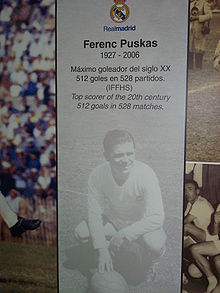
Puskás in the Hall of Fame
.jpg)
World Cup final, 86th minute: Puskás scores to make it supposedly 3:3, but offside
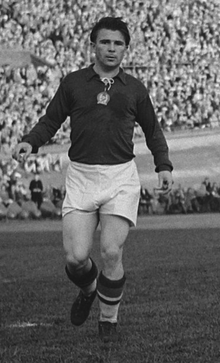
Ferenc Puskás (1954)
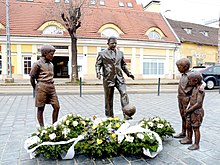
Statue by Ferenc Puskás in memory of the team captain of the "Golden Eleven". The sculpture was unveiled on 28 March 2013 in Budapest, III District.
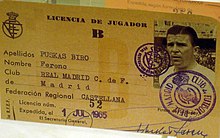
Ferenc Puskás' player licence
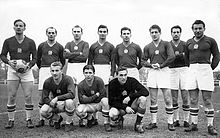
The Golden Eleven (1953) in front in the middle: Ferenc Puskás
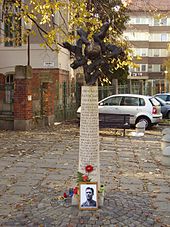
The sculpture Golden Eleven by Márton Kalmár in Szeged - with flowers, candles and a memorial picture Puskás is remembered on the day after his death.
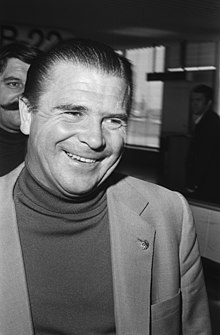
Ferenc Puskás (1971)
Career (Overview)
Hungary (1939 to 1956)
In Hungary he only played for Honvéd Budapest, whose name changed several times: Kispesti FC (1939 to 1944), Kispesti AC (1944 to 1949) and Budapesti Honvéd (1949 to 1956). In the 1947/48 season he scored 50 season goals in 32 games for Kispest, a record that still stands today. In total he won six championships. Between 1946 and 1956 he was nominated 18 times for the Budapest city selection and scored 15 goals.
Spain (1958 to 1966)
Abroad, he was with Real Madrid between 1958 and 1967, who owe in no small part to him their magnificent period of the late 50s and early 60s. From 1958 to 1966, which is practically his entire time at the club, Real were unbeaten at home. In all, he scored 324 goals in 372 games for Real Madrid.
He scored 35 goals in 39 appearances for Spain in the European Cup and was top scorer in the 1959/60 season with 12 goals. In the 1960 final, he scored four goals in a 7-3 win over Eintracht Frankfurt - the highest-scoring European Cup final to date (Alfredo Di Stéfano scored the other three). In 1961/62 he was again top scorer in the Champions Cup with seven goals, ex aequo with Di Stéfano and Tejada, who also played for Real Madrid. In the final, which Real lost 5-3 to the Béla Guttmann-coached Benfica Lisbon side, Puskás scored all three of his team's goals. Two years later, Real again reached the European Cup final, but were soundly beaten 3-1 by Inter Milan. In 1966, a much rejuvenated Real Madrid side finally won the European Cup again against FK Partizan Belgrade. Puskás did not play in the final at the Heysel Stadium in Brussels, but as a 39-year-old he became the team's top scorer with five goals in three games.
Hungarian national team (1945 to 1956)
His national team career began at the age of 17, on 20 August 1945, in a 5-2 win over Austria in Budapest, and ended on 14 October 1956 with a 2-0 win in Vienna, also against Austria. He scored a goal in each of the two games.
In 1950 he scored four goals in the 12:0 win against Albania. In four other games he scored 3 goals each (1946 7:2 against Luxembourg, 1948 5:1 against Romania, on 8 May 1949 6:1 against Austria and on 29 October 1950 4:3 against Austria). In more than 50 international matches he could register himself in the scorer's list. He won 63 times with Hungary and lost only 11 games, another 11 games ended in a draw. He scored 84 goals in 85 internationals for Hungary, making him Hungary's record goalscorer.
Spanish national team (1961 to 1962)
He played for the Spanish national team between 1961 and 1962, but failed to score in four games.
His first game was the final first leg of the African Qualifying Group (CAF) against Morocco on 12 November 1961 in Casablanca (Spain won 1-0). He played the remaining three games at the 1962 World Cup in Chile. However, as Spain failed already in the group stage, the last group match in Sausalito against Brazil on 6 June 1962 (final score 2-1 for Brazil) was also his last appearance for Puskás. This gives him a record of 2 wins and 2 losses (0 goals) for the Spanish national team.
Hit rate
Puskás has an extraordinary tally of 84 goals in 85 appearances for the Hungarian national team (strike rate 0.988). Pelé, for example, scored a comparatively low 77 goals in 92 appearances for the Brazilian national team (odds of 0.837). German international Gerd Müller had a comparatively better tally of 68 goals in 62 internationals (odds of 1.097), but played 22 fewer internationals than Puskás. Puskás' team-mate Sándor Kocsis had the best goalscoring rate with 75 goals in 68 internationals, giving him odds of 1.103 goals per game.
Legends
- A legend says that he, who as a professional always shot with his left foot, broke all the ribs of the opposing goalkeeper with a shot from his strong leg (the right) in one of the first games of his career and since then was only allowed to shoot with his weak, left foot. The fact that his surname bears a strong resemblance to the Hungarian word for "gun" - puska - certainly contributed to the creation of the legend. In truth, Puskás hardly used his right foot, as he was a "pure" left-footer.
- It often happened that the association did not pay out the promised bonuses. In 1952, for example, the following exchange of words allegedly took place at the Wankdorf in Berne against the Swiss team when the score was 2-0 in favour of Switzerland. Puskás shouted to coach Gusztáv Sebes, "Guszti, is there still no money for the victory?" But since Sebes had been assured of the win bonus moments earlier, he said, "Yes, there is, money!" Then Hungary shifted up a gear and won 4:2 against Switzerland.
Search within the encyclopedia